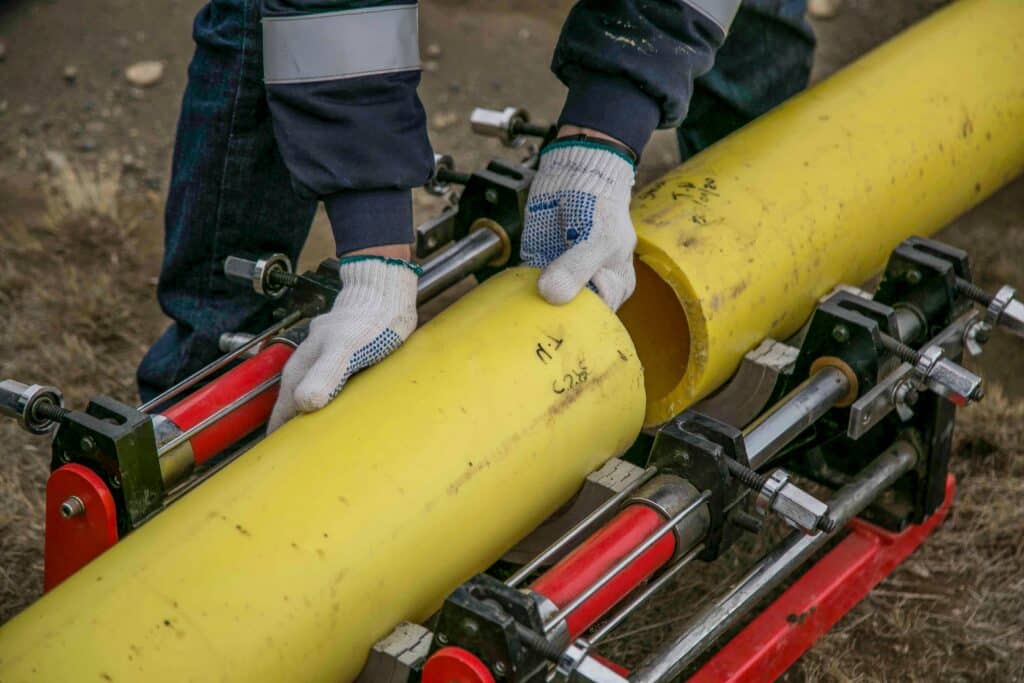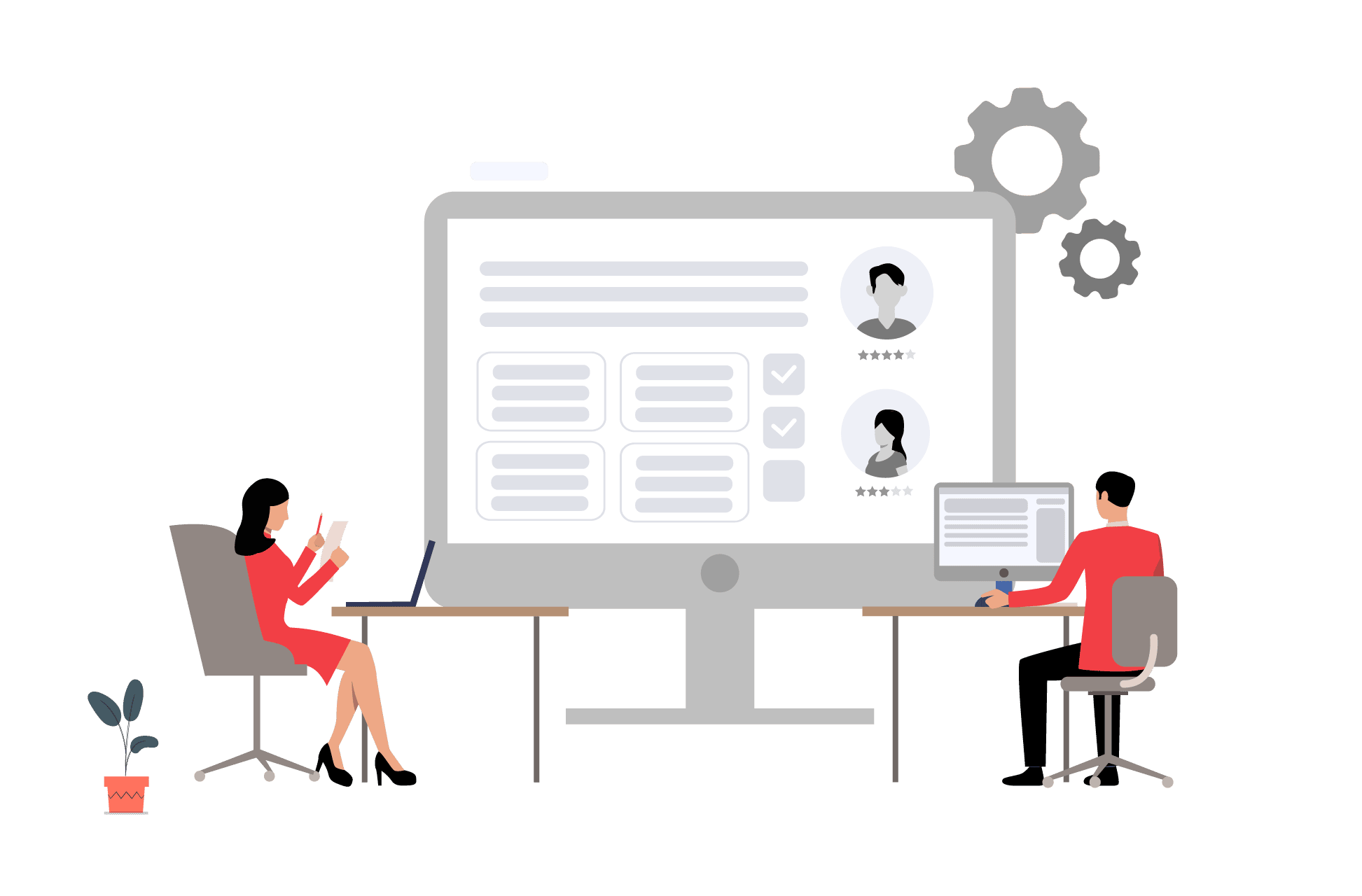In the world of construction and maintenance, few roles are as pivotal as that of a plumber/pipefitter. These skilled professionals are the unsung heroes of the infrastructure, ensuring that pipes and plumbing systems are not just installed but also maintained to perfection. Their work may go unnoticed, but its impact on the growth and stability of any company is undeniable.
A plumber/pipefitter’s expertise is crucial in maintaining the integrity of a building’s water supply and drainage systems. They play a vital role in ensuring the safety and efficiency of plumbing installations, which, in turn, directly affects the functionality and reputation of a company. A single leak or malfunction can result in costly repairs and even downtime.
In this blog, we’ll explore the essential aspects of hiring plumber/pipefitters, from assessing their hard and soft skills to finding the right fit for your team. Discover how you can evaluate their on-the-job capabilities, ultimately ensuring that your next plumber/pipefitter hire contributes to the success and growth of your company.
What is a Plumber/Pipefitter?
A plumber/pipefitter is a highly skilled professional responsible for the installation, maintenance, and repair of plumbing and piping systems in various industries. This role plays a crucial part in a company’s growth and stability by ensuring the seamless flow of water, gases, and other essential fluids. Here’s a breakdown of their roles and responsibilities:
- Installation: Plumber/pipefitters are tasked with installing new plumbing systems in buildings and structures, ensuring they meet industry standards and local codes.
- Maintenance: They perform routine inspections and maintenance to prevent issues and keep systems running efficiently, reducing the risk of costly breakdowns.
- Repairs: When plumbing problems arise, plumber/pipefitters diagnose issues and execute repairs promptly, minimizing disruptions to business operations.
- Customization: They may customize piping systems for specific needs, such as industrial processes or specialized equipment.
- Safety Compliance: Ensuring compliance with safety regulations is paramount, as it safeguards employees, clients, and the company from potential hazards.
- Collaboration: Effective communication and teamwork with other tradespeople, contractors, and clients are essential for project success.
In essence, a plumber/pipefitter’s role is not just about fixing pipes; it’s about ensuring the reliability of a company’s infrastructure. Their expertise directly contributes to a company’s growth by minimizing downtime, reducing operational costs, and maintaining a safe and efficient work environment.
Plumber/pipefitter hard skills
When assessing candidates for plumber/pipefitter positions, it’s crucial to focus on their hard skills, as these technical abilities are the foundation of their expertise. Here are the key hard skills to look for and how to assess them:
1. Pipe Installation and Repair: Evaluate a candidate’s proficiency in installing and repairing pipes, including different types such as copper, PVC, and steel. Ask for examples of projects they’ve worked on and inquire about their knowledge of pipe materials and joining techniques.
2. Reading Blueprints: Check if the candidate can interpret plumbing blueprints and schematics accurately. Provide them with a sample blueprint and ask them to identify key components and connections.
3. Pipe Welding: If welding is required for your projects, assess the candidate’s welding skills. Request certifications or demonstration of welding techniques.
4. Plumbing Codes and Regulations: Inquire about their knowledge of local plumbing codes and safety regulations. Ask hypothetical questions to gauge their understanding of compliance.
5. Troubleshooting: Pose scenarios where plumbing issues need quick diagnosis and resolution. Evaluate their problem-solving skills and ability to handle emergencies effectively.
6. Tools and Equipment: Confirm their familiarity with various plumbing tools and equipment. A practical test where they identify and explain tool usage can be insightful.
7. Pipefitting Techniques: Assess their ability to measure, cut, and fit pipes accurately. Ask about their experience with threading and bending pipes.
8. Leak Detection and Testing: Request examples of how they’ve conducted leak detection and pressure testing in previous roles. Discuss their methods for ensuring system integrity.
By focusing on these hard skills during the assessment process, you can identify candidates who possess the technical expertise necessary for success as a plumber/pipefitter in your company. Practical demonstrations, past project discussions, and scenario-based questions are effective ways to evaluate these skills thoroughly.

Plumber/pipefitter soft skills
While technical expertise is vital for plumber/pipefitter positions, soft skills are equally crucial, as they directly impact a candidate’s ability to work effectively in a team, solve problems, and communicate with clients. Here are the key soft skills to assess and how to evaluate them:
1. Communication Skills: Effective communication is essential when working with clients, team members, and contractors. During the interview, assess how well the candidate articulates their thoughts and listens to others. Ask about their experience in handling client inquiries and explaining plumbing issues clearly.
2. Problem-Solving Abilities: Plumber/pipefitters often encounter unexpected challenges on the job. Present hypothetical scenarios and gauge the candidate’s problem-solving skills. Inquire about times they’ve resolved complex issues in previous roles.
3. Adaptability: The construction and plumbing industry can be dynamic. Assess a candidate’s ability to adapt to changing project requirements or unexpected delays. Ask for examples of how they’ve adjusted to unforeseen circumstances.
4. Attention to Detail: Precision is crucial in plumbing work. Discuss their approach to ensuring accurate measurements, fittings, and installations. Inquire about their quality control practices.
5. Time Management: Plumbing projects often have tight schedules. Ask about their time management skills and how they prioritize tasks to meet deadlines. Seek examples of projects completed on time and within budget.
6. Customer Service: For client-facing roles, assess their customer service skills. Inquire about their approach to handling client complaints or concerns. Request references from previous clients if available.
7. Teamwork: Plumbers and pipefitters frequently collaborate with other tradespeople. Ask about their experience working in multidisciplinary teams and their strategies for promoting teamwork on-site.
8. Stress Management: Plumbing projects can be high-pressure situations. Discuss how candidates handle stress and ensure that they can remain calm and focused during challenging moments.
Assessing these soft skills alongside hard skills is essential to finding a well-rounded plumber/pipefitter who can not only execute the technical aspects of the job but also contribute positively to the work environment and client satisfaction. Behavioral interview questions and reference checks can provide valuable insights into a candidate’s soft skills.
How to test a plumber/Pipefitter’s skills?
Evaluating a plumber/pipefitter’s skills effectively is crucial to ensure they are well-equipped for the job. Here are different technical tests you can use to assess their capabilities and why these tests are essential:
1. Practical Plumbing Test: This hands-on assessment involves asking candidates to complete plumbing tasks, such as installing fixtures, repairing leaks, or assembling pipe systems. It provides a real-world demonstration of their skills and knowledge.
2. Blueprint Interpretation: Provide candidates with plumbing blueprints and assess their ability to understand and follow the plans accurately. This test ensures they can work according to project specifications.
3. Pipe Welding Test: If welding is a requirement for the position, have candidates demonstrate their welding skills. This test verifies their proficiency in joining pipes securely.
4. Plumbing Code Exam: Present candidates with questions related to local plumbing codes and regulations. Their knowledge of these codes is vital to ensure compliance and safety.
5. Problem-Solving Scenarios: Pose hypothetical plumbing problems and observe how candidates approach and solve them. This test assesses their critical thinking and troubleshooting abilities.
6. Pipefitting Techniques: Ask candidates to demonstrate pipe cutting, threading, and fitting techniques. This practical test ensures they can perform these tasks accurately.
7. Leak Detection and Pressure Testing: Provide candidates with a simulated scenario involving a leak or pressure issue. Evaluate their ability to identify and address the problem effectively.
These tests are essential because they go beyond a candidate’s resume and interview responses. They provide concrete evidence of a candidate’s technical capabilities, helping you make an informed hiring decision. By using a combination of these assessments, you can identify candidates who not only have the required hard skills but can also apply them effectively on the job.
Where to find the best Plumber/Pipefitter?
Finding the right plumber/pipefitter for your team involves tapping into various sources to identify the most qualified and skilled candidates. Here’s how to navigate these platforms and sources effectively:
1. Local Trade Schools and Apprenticeship Programs: These institutions are breeding grounds for budding plumber/pipefitters. Attend career fairs or partner with schools to connect with individuals who are passionate about plumbing and have received formal training.
2. Job Boards and Online Platforms: Utilize popular job search websites and industry-specific platforms to post job listings. Be sure to include detailed job descriptions and requirements to attract candidates with the right skill sets.
3. Industry Associations: Networking within industry associations and attending their events can help you discover experienced professionals. These candidates often have a strong commitment to their trade and stay updated on industry best practices.
4. Recommendations: Don’t underestimate the power of word-of-mouth referrals. Ask your existing employees, industry contacts, and business partners if they know of skilled plumber/pipefitters who may be seeking new opportunities.
5. Social Media and Online Communities: Engage with plumbing and construction groups on social media platforms like LinkedIn or industry-specific forums. Posting job openings in these communities can attract candidates who are passionate about their field.
6. Recruitment Agencies: Consider partnering with recruitment agencies specializing in skilled trades. They have access to a vast network of candidates and can help streamline the hiring process.
7. Employee Referral Programs: Encourage your current team to refer potential candidates. Employees often refer individuals they trust and believe would be a valuable addition to the company.
8. Local Trade Publications: Advertise in local trade magazines or newspapers to reach candidates who are actively engaged in the plumbing and pipefitting industry.
To find the best plumber/pipefitter, it’s essential to cast a wide net across these various channels. Each source has its unique advantages, allowing you to access a diverse pool of talent. Additionally, maintaining a strong online presence and clearly communicating your company’s values and opportunities will help attract top-notch candidates who align with your organization’s goals.
Job template for hiring Plumbers/pipefitters
About Us:
[Company Name] is a leading [Location]-based [industry/sector] company known for our commitment to excellence and innovation in plumbing and pipefitting. With a track record of [X] years in the industry, we take pride in delivering top-quality services to our clients.
Responsibilities:
- Install, repair, and maintain plumbing and piping systems in commercial and residential buildings.
- Interpret plumbing blueprints and schematics to ensure accurate installations.
- Identify and troubleshoot plumbing issues, providing timely and effective solutions.
- Collaborate with team members, contractors, and clients to ensure project success.
- Adhere to local plumbing codes and safety regulations to maintain a safe work environment.
- Keep accurate records of work performed, materials used, and time spent on tasks.
- Perform routine maintenance to prevent system failures and costly repairs.
Qualifications:
- years of experience as a plumber/pipefitter.
- Proficiency in pipe installation, repair, welding, and plumbing codes.
- Ability to read and interpret plumbing blueprints and schematics.
- Strong problem-solving skills and attention to detail.
- Excellent communication and teamwork abilities.
- Valid [State] plumbing license (if applicable).
- [Additional qualifications specific to your organization].
Why Join Us?
- Join a dynamic team that values collaboration, innovation, and excellence.
- Opportunity for career growth and professional development.
- Competitive salary and benefits package.
- Commitment to a safe and inclusive work environment.
- [Additional reasons specific to your organization].
Benefits:
- Competitive salary and performance-based bonuses.
- Health, dental, and vision insurance.
- Retirement savings plan (401(k)) with employer contributions.
- Paid time off and holidays.
- Ongoing training and professional development opportunities.
- Employee assistance program.
- [Other benefits offered by your organization].
Application Process:
To apply, please submit your resume and a cover letter detailing your relevant experience and qualifications to [email address]. Please include “Plumber/Pipefitter Application – [Your Name]” in the subject line.
We thank all applicants for their interest in [Company Name], but only those selected for an interview will be contacted.
[Company Name] is an equal opportunity employer. We encourage applications from candidates of all backgrounds and experiences.
Other Important Information:
- Application deadline: [Insert deadline]
- Starting date: [Insert starting date]
- Location: [Insert location]
- Working hours: [Insert working hours]
- [Any other important details about the position or application process specific to your organization.]
Feel free to customize this template to match your company’s specific requirements and values before posting it on job boards and sharing it with potential candidates.
Plumber/pipefitter costs in the US (2023):
The cost of hiring a plumber/pipefitter in the US varies based on their experience and skill level:
- Entry-Level Plumber/Pipefitter (0-2 years): On average, entry-level professionals charge between $20 to $30 per hour.
- Mid-Level Plumber/Pipefitter (3-5 years): Mid-level plumbers with a few years of experience typically command rates ranging from $30 to $45 per hour.
- Experienced Plumber/Pipefitter (6+ years): Highly experienced professionals with 6 or more years of expertise can charge $45 to $70 per hour or more.
It’s important to note that these rates may vary by location, job complexity, and specific skills possessed by the plumber/pipefitter.
Top 15 interview questions for Plumber/Pipefitter candidates
When hiring a plumber/pipefitter, asking the right questions is crucial to assess their suitability for the role. We’ve categorized these questions into three key areas: soft skills, hard skills, and general skills.
Soft Skills:
- Can you describe a situation where you had to communicate complex plumbing issues to a client or team member? How did you handle it?
- Tell us about a time when you had to collaborate with others on a project. How did you contribute to the team’s success?
- How do you handle high-pressure situations or unexpected challenges on the job? Can you provide an example?
Hard Skills:
- What types of plumbing materials and tools are you most experienced with?
- Walk us through the steps you take when diagnosing and repairing a complex plumbing issue.
- Can you explain your experience with reading and interpreting plumbing blueprints and schematics?
General Skills:
- How do you stay updated with the latest plumbing codes and regulations in our region?
- Describe your experience with pipe installation and repair. Have you worked with different types of pipes?
- Can you provide examples of projects where you’ve conducted leak detection and pressure testing?
- What safety measures do you prioritize on the job site to prevent accidents and ensure a safe working environment?
Problem-Solving and Critical Thinking:
- Share a challenging plumbing problem you’ve encountered. How did you approach it, and what was the outcome?
- When facing a complex project, how do you plan and organize your tasks to ensure efficiency and timely completion?
Client Interaction and Service:
- How do you handle client inquiries, complaints, or concerns? Can you share a positive client interaction experience?
- Describe a project where you had to balance client expectations with project constraints. How did you manage this situation?
Teamwork and Leadership:
- Have you ever taken on a leadership role within a plumbing team? Can you provide an example of how you motivated and guided your team to success?
Asking these questions during the interview process will help you assess a candidate’s soft skills, hard skills, and general skills, ensuring you find the right fit for your plumber/pipefitter position.
Assess for Plumber/Pipefitter skills to avoid Mis-Hires
In the competitive world of plumbing and pipefitting, making the right hiring decision is paramount. Mis-hires can lead to costly delays, rework, and frustration. To mitigate these risks, it’s crucial to implement skill assessments in your hiring process.
Reducing Time to Hire: Skill assessments allow you to quickly identify candidates who possess the technical proficiency required for the job. By evaluating their abilities upfront, you can significantly reduce the time spent on lengthy interviews and vetting processes.
Enhanced Assessment Accuracy: Assessments provide tangible evidence of a candidate’s capabilities, going beyond their resume or interview performance. Practical tests, blueprint analysis, and problem-solving scenarios offer a holistic view of their skills.
Introducing Testlify – your talent assessment solution:
Consider leveraging Testlify, a cutting-edge talent assessment tool that streamlines the evaluation of plumber/pipefitter candidates. With Testlify, you can customize assessments to align with your specific job requirements, ensuring a perfect fit for your team.
Ready to Make Informed Hiring Decisions? Schedule a Demo Today!
Don’t leave your hiring decisions to chance. Schedule a demo with Testlify to explore how our platform can help you assess plumber/pipefitter skills effectively and efficiently. Make the right hires and avoid costly missteps in your recruitment process.








